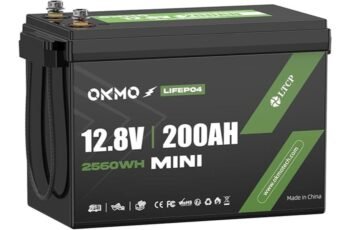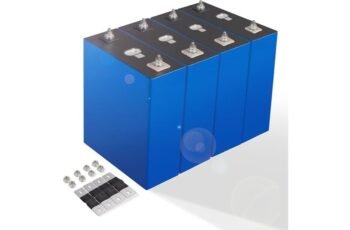The DEASON 12V 100Ah Mini LiFePO4 presents a compact 1280Wh solution aimed at tight installs in boats, RVs, and backup systems. It pairs a 100A BMS with UL-tested cells, promising stable output and low self-discharge. Its slim footprint and 24.2 lb weight are practical advantages. Yet limits on current and expansion, plus hazy long-term warranty terms, complicate the value proposition. Whether it truly balances performance and constraints is the next question.
Key Takeaways
- Compact 12V 100Ah LiFePO4 pack delivers 1280Wh in a 24.2 lb, 6.61 × 10.23 × 8.35 in form, ideal for tight spaces.
- 100A BMS supports solid continuous loads with protections for overcharge, overdischarge, over-current, overheating, and short circuits.
- Claimed longevity is strong: up to 15,000 cycles at 60% depth of discharge and a 10-year service life claim.
- Expansion supports up to 4 in series (48V) or 4 in parallel (400Ah), requiring matched, pre-balanced packs above 13.4V.
- Limitations include 100A continuous current cap, 1280Wh max per unit, four-battery limit, and unclear long-term warranty beyond a 30-day return.
280WH Mini Powerhouse
How much usable watt-hours can a compact case really hold? In this case, up to 1,280Wh, delivered by a 12V 100Ah LiFePO4 pack that weighs 24.2 pounds and measures 6.61 x 10.23 x 8.35 inches. That energy-to-size ratio positions it as a dense, portable reservoir for small footprints.
A 100A BMS supports substantial continuous draw within a 12V system, enabling respectable peak loads in typical DC setups. Series and parallel scalability—up to 48V 100Ah or 12V 400Ah—extends headroom without changing the base module. For users constrained by space and weight, this mini format concentrates meaningful watt-hours per cubic inch.
Detailed features
Curiously compact yet capable, the DEASON 12V 100Ah Mini LiFePO4 centers on a 100A BMS that guards against overcharge, overdischarge, over-current, overheating, and short circuits while enabling solid continuous draws. Grade-A UL-tested cells, excellent self-discharge control, and guidance for periodic top-ups support longevity. It stores 1280Wh in a 24.2-pound shell measuring 6.61 x 10.23 x 8.35 inches, and accepts series or parallel expansion up to 4 units per bank. Clear connection rules require equal capacity, same brand, and pre-balance above 13.4V. It fits marine, RV, solar, and backup roles with balanced power density and compact packaging.
| Feature | Detail |
|---|---|
| Capacity | 12V 100Ah (1280Wh) |
| BMS | 100A protection suite |
| Size/Weight | 6.61×10.23×8.35 in; 24.2 lb |
| Expansion | Up to 4S or 4P |
Pros and Cons
Next, the review outlines the key pros and cons of the DEASON 12V 100Ah Mini LiFePO4 battery. It weighs strengths such as compact size, robust 100A BMS protection, and long cycle life against limitations like capacity trade-offs and series/parallel constraints. Readers can quickly gauge whether its benefits align with their use case.
Pros
Why does the DEASON 12V 100Ah Mini stand out? It delivers 1280Wh in a compact 6.61 x 10.23 x 8.35-inch footprint and just 24.2 pounds, easing installation in tight spaces. A robust 100A BMS provides protection against overcharge, overdischarge, over-current, overheating, and short circuits. Grade-A UL-tested cells and an excellent self-discharge rate support reliability.
Longevity is a highlight: up to 15,000 cycles at 60% DOD and a claimed 10-year service life, with clear guidance for 100% DOD cycling. Versatility impresses—ideal for marine, RV, solar, and backup use—plus straightforward expansion to 48V 100Ah or 12V 400Ah via series/parallel.
Cons
However, several drawbacks merit attention. The 100A BMS caps continuous current, limiting high-draw inverters or powerful trolling motors. Claimed 15,000 cycles apply at 60% DOD, so true longevity at 80–100% DOD is far lower. The weight listing is inconsistent (20.91 vs 24.2 lb), raising spec confidence concerns. Only a 30-day Amazon return is explicit; long-term warranty details are unclear. Four-battery limits in series/parallel constrain larger systems. Pre-connection requirements (matching brand, capacity, voltage >13.4V) add setup friction. Max energy is just 1280Wh, so multiple units may be needed. Availability is recent, with limited field history.
Concluding thoughts
Ultimately, the DEASON 12V 100Ah Mini LiFePO4 stands out for its compact size, low weight, and robust 100A BMS, delivering up to 1280Wh with long-cycle durability. Its Grade-A UL-tested cells, extensive protections, and excellent self-discharge rate make it a dependable choice for RVs, boats, and solar storage. Expandability to 48V or 400Ah broadens use cases, provided identical packs are balanced above 13.4V before linking. While not the lightest in class, the 24.2-pound package and small footprint suit tight installs. With 15,000 cycles at 60% DOD and basic maintenance, it offers strong value and practical reliability.
Conclusion
In the end, the DEASON 12V 100Ah Mini LiFePO4 reads like a pocket Odyssey—compact, steadfast, and built for tight quarters. Its 1280Wh stamina, guarded by a 100A BMS and Grade-A cells, suggests many calm crossings. Yet siren notes remain: the 100A ceiling, four-pack limit, and hazy long-term warranty. For RVs, marine cabins, and backup niches, it’s a reliable keel. Those seeking boundless horizons may look elsewhere; pragmatists will welcome its measured, modern ballast.



